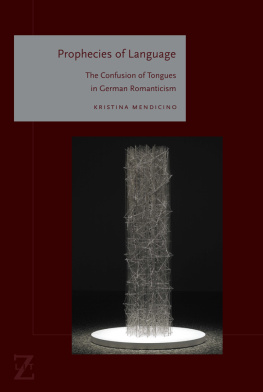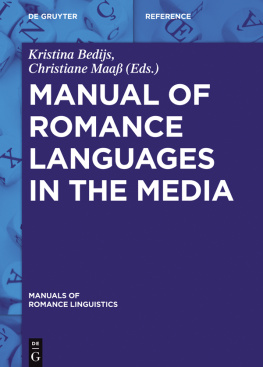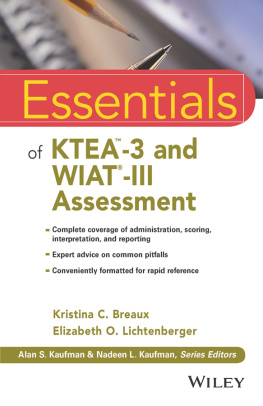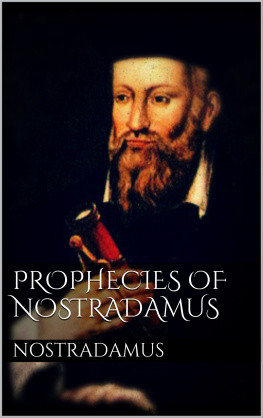Kristina Mendicino - Prophecies of Language
Here you can read online Kristina Mendicino - Prophecies of Language full text of the book (entire story) in english for free. Download pdf and epub, get meaning, cover and reviews about this ebook. year: 2016, genre: Home and family. Description of the work, (preface) as well as reviews are available. Best literature library LitArk.com created for fans of good reading and offers a wide selection of genres:
Romance novel
Science fiction
Adventure
Detective
Science
History
Home and family
Prose
Art
Politics
Computer
Non-fiction
Religion
Business
Children
Humor
Choose a favorite category and find really read worthwhile books. Enjoy immersion in the world of imagination, feel the emotions of the characters or learn something new for yourself, make an fascinating discovery.
- Book:Prophecies of Language
- Author:
- Genre:
- Year:2016
- Rating:4 / 5
- Favourites:Add to favourites
- Your mark:
- 80
- 1
- 2
- 3
- 4
- 5
Prophecies of Language: summary, description and annotation
We offer to read an annotation, description, summary or preface (depends on what the author of the book "Prophecies of Language" wrote himself). If you haven't found the necessary information about the book — write in the comments, we will try to find it.
Prophecies of Language — read online for free the complete book (whole text) full work
Below is the text of the book, divided by pages. System saving the place of the last page read, allows you to conveniently read the book "Prophecies of Language" online for free, without having to search again every time where you left off. Put a bookmark, and you can go to the page where you finished reading at any time.
Font size:
Interval:
Bookmark:
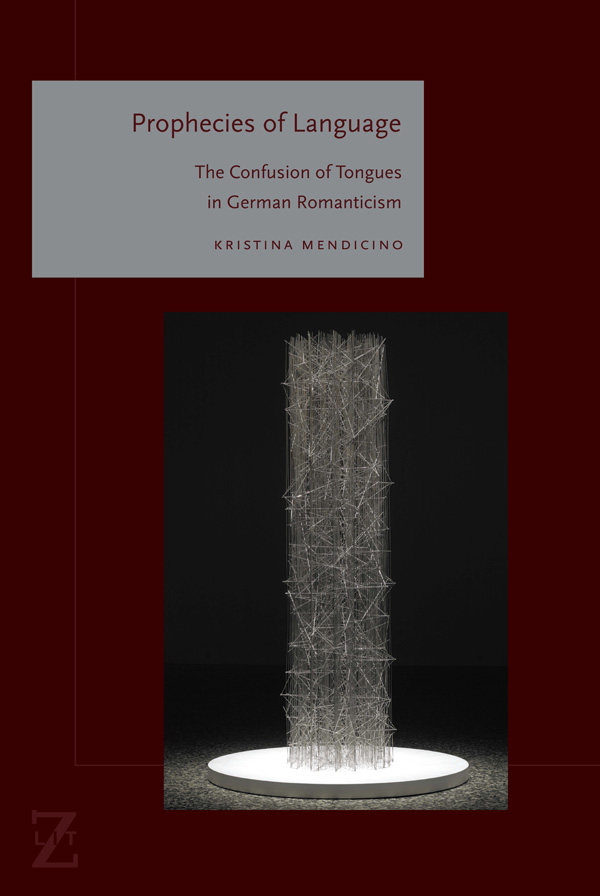

Sara Guyer and Brian McGrath, series editors
Lit Z embraces models of criticism uncontained by conventional notions of history, periodicity, and culture, and committed to the work of reading. Books in the series may seem untimely, anachronistic, or out of touch with contemporary trends because they have arrived too early or too late. Lit Z creates a space for books that exceed and challenge the tendencies of our field and in doing so reflect on the concerns of literary studies here and abroad.
At least since Friedrich Schlegel, thinking that affirms literatures own untimeliness has been named romanticism. Recalling this history, Lit Z exemplifies the survival of romanticism as a mode of contemporary criticism, as well as forms of contemporary criticism that demonstrate the unfulfilled possibilities of romanticism. Whether or not they focus on the romantic period, books in this series epitomize romanticism as a way of thinking that compels another relation to the present. Lit Z is the first book series to take seriously this capacious sense of romanticism.
In 1977, Paul de Man and Geoffrey Hartman, two scholars of romanticism, team-taught a course called Literature Z that aimed to make an intervention into the fundamentals of literary study. Hartman and de Man invited students to read a series of increasingly difficult texts and through attention to language and rhetoric compelled them to encounter the bewildering variety of ways such texts could be read. The series conceptual resonances with that class register the importance of recollection, reinvention, and reading to contemporary criticism. Its books explore the creative potential of readings untimeliness and historys enigmatic force.
Kristina Mendicino
Fordham University Press
New York 2017

This book is made possible by a collaborative grant from the Andrew W. Mellon foundation.
Copyright 2017 Fordham University Press
All rights reserved. No part of this publication may be reproduced, stored in a retrieval system, or transmitted in any form or by any meanselectronic, mechanical, photocopy, recording, or any otherexcept for brief quotations in printed reviews, without the prior permission of the publisher.
Fordham University Press has no responsibility for the persistence or accuracy of URLs for external or third-party Internet websites referred to in this publication and does not guarantee that any content on such websites is, or will remain, accurate or appropriate.
Fordham University Press also publishes its books in a variety of electronic formats. Some content that appears in print may not be available in electronic books.
Visit us online at www.fordhampress.com.
Library of Congress Cataloging-in-Publication Data available online at http://catalog.loc.gov
Printed in the United States of America
19 18 17 5 4 3 2 1
First edition
.for Rainer Ngele
... But often as a firebrand
arises conf(used)usion of tongues....
... Oft aber wie ein Brand
entstehet Sprachverw(irrt)irrung....
In the midst of a fragment from his Homburger Folioheft (Smtliche Werke: Frankfurter Ausgabe 7: 377), a notebook that contains several late elegies and odes and even more notes for poems that would never be completed, Friedrich Hlderlin registers the confusion of tongues. His words arise among fragments written in several languages: his sentence appears to be written in German; a nearby marginal note in Latin reads, sphere of the ecclesia [orbis ecclesiae] (7: 374); several pages earlier, he records a passage in ancient Greek from Pindars thirteenth Olympian ode, below the bilingual heading Origin of Loyot [Ursprung der Loyot] (7: 365). Thus, Hlderlins sentence stands out, apart from the draft of the poem to which it seems to belong, as though to state yet again what takes place so often in these pages. The passage, Oft aber wie ein Brand / Entstehet Sprachverw(irrt)irrung, might thus be considered the fragment of fragments at this late stage of Hlderlins writing between 1803 and 1807, when he would produce the last poems to be published in his lifetime, as well as his translations of Sophocless Oedipus and Antigone. But it is more than a manifestation of Hlderlins late writing praxis. The excess at issue here, as tongues grow confounded with others and language emerges as fire, also speaks to the issues of translation, the origins of language, and prophecy that would preoccupy Hlderlin and many of his contemporaries, including Wilhelm von Humboldt, Friedrich Schlegel, and G. W. F. Hegel. No sooner does language emerge than the problem of its plurality and translatablity begins. And even before there is any talk of language, firean element associated with ancient prophecy, Pentecost, and the of the Stoicsheralds its coming, and forebodes its end before it can even begin: But often as a firebrand, arises confusion of tongues.
But what does speaking in tongues say? And what could one say of it? Hlderlins fragment speaks to the precariousness of any inquiry into the confusion of tongues and prophecy. For if one takes his comparison of linguistic emergence to a devastating firebrand seriously, one must confront the possibility that it may never be witnessed; that it could not be adequately addressed in any direct way or in any one tongue; and that language, as such, would not at first have been a means of communication, let alone transparent communication. Rather, Hlderlins words imply that, every time it emerges, language will have been radically different from our understanding of words and from any words we understand, and that it will have been, from the start, other in and to itself. Unlike Enlightenment narratives of the origins of language, which also describe primal scenes of emergence for which there neither is nor can be a historical record, Hlderlins poem dismisses the operative assumptions of Jean-Jacques Rousseau, tienne de Condillac, and, to a lesser degree, Johann Gottfried Herder: namely, that language would have originated in the way we use and know it, and that the first language would have been one. Thus, Hlderlins fragment demands a reconsideration of language as such. And, as I hope to show in the course of this book, the most intensive considerations of language in Hegels, Wilhelm von Humboldts, and Friedrich Schlegels writings similarly call for a radical rethinking of language. Reading philosophical and literary texts of German Romanticism and German Idealism in relationship to Greek (and other) precursors, I argue in Prophecies of Language that a philological response to this demand not only uncovers aspects of these texts that would otherwise remain silent or ignored but also opens the possibility of questioning many tacit assumptions about what languages might mean. But how could this problem be addressed or pursued at all? What method or modus of writing could address it adequately, if the conventions of expository prose, too, must be placed in question by the nature of the issue? With Hlderlins fragment, one quickly arrives at an impasse.
A detour is in order, to sketch a possible way to speak to the problems that emerge with Hlderlins text more precisely. Precisely by speaking of confusion of tongues [
Font size:
Interval:
Bookmark:
Similar books «Prophecies of Language»
Look at similar books to Prophecies of Language. We have selected literature similar in name and meaning in the hope of providing readers with more options to find new, interesting, not yet read works.
Discussion, reviews of the book Prophecies of Language and just readers' own opinions. Leave your comments, write what you think about the work, its meaning or the main characters. Specify what exactly you liked and what you didn't like, and why you think so.

